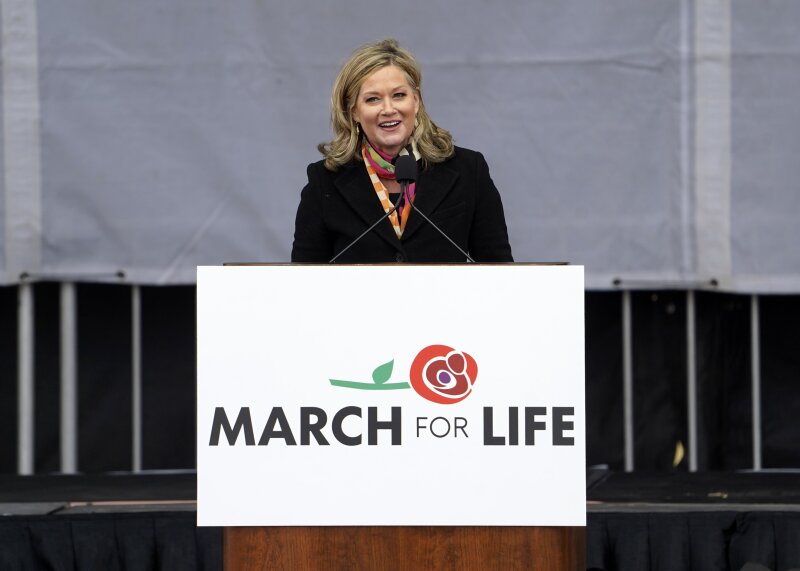
MARCH FOR LIFE EXPANDS STATE MARCHES, UNDERSCORING STATES' VARIED ABORTION LAWS
By Kurt Jensen
10/08/2023
WASHINGTON (OSV News) — Headed into its 50th year, the March for Life, a fixture of Catholic pro-life activism held in the nation's capital each January, is about to become part of a tapestry.
The organization's long-planned expansion of state marches will eventually make pro-life marches both nationwide and nearly year-round. The goal is to have them in all 50 states by the end of the decade.
With the U.S. Supreme Court's 2022 overturning its 1973 Roe v. Wade decision, which had made abortion access a constitutional right, and returning the issue of abortion regulation to the states, pro-life activists' plan is to show support for restrictions or bans on abortion, even in states such as Michigan and California, where referendums have enshrined its availability in state constitutions.

50th annual March for Life in Washington Jan. 20, 2023.
OSV News photo/Gregory A. Shemitz
The first statewide march in Richmond, Virginia, was held in 2019, drawing a larger-than-expected crowd of around 7,000 participants.
Joining that one will be marches in Bismarck, North Dakota, and Columbus, Ohio, Oct. 6; Harrisburg, Pennsylvania, Oct. 16; Lansing, Michigan, Nov. 8; and following the marches in Washington Jan. 19, 2024, and Richmond, Virginia, Feb. 21, there will be marches in Atlanta Feb. 22, Denver April 12 and Sacramento, California, April 22.
Planned marches next year in Hartford, Connecticut, and Phoenix have yet to be scheduled.
March for Life President Jeanne Mancini told OSV News the goal is to have a total of 16 marches in 2024. "Each state is different," she observed.
In North Dakota, abortion is banned at all stages of fetal gestation. In Ohio, voters will decide in November whether to include abortion in the state constitution. Georgia has a six-week ban, and in Virginia, Gov. Glenn Youngkin has said that if Republicans gain control of both houses of the General Assembly in November, he'll push for a 15-week ban.
Legislative proposals are generated by March for Life Action, the organization's political arm. Mancini said of California and Michigan, "We're really on the defensive there."
The national rally and march has, from the first one in 1974, drawn support from the Knights of Columbus. State marches are using partnerships with different public policy organizations for their volunteers. "There's not a cookie-cutter approach," Mancini said.
The Pennsylvania march, for instance, is in partnership with the Pennsylvania Family Institute, the Ohio march is in partnership with the Center for Christian Virtue, and the Virginia march with The Family Foundation.
In addition to creating the state marches, Mancini, who has led March for Life since its founder, Nellie Gray, died in 2012, has expanded the activities beyond their original Catholic roots to give evangelicals prominent roles in participation.The banner in the Washington march in January was carried by students from Liberty University.
For Mancini, that's not such a big development. "The march is nonsectarian in its foundational document," she said, and evangelicals are "a very important ally for us."
But she stressed, "Our Catholic alliances are as strong as ever."
And, despite the lingering impression left after President Donald Trump addressed the 2020 March for Life rally on the National Mall, becoming the first president to do that in person, "We don't endorse candidates. We educate on the issues," she said.
After 11 years at the helm, Mancini says she has no plans on the horizon to leave. "I'm very honored to be in the service of the (march) board."
-
